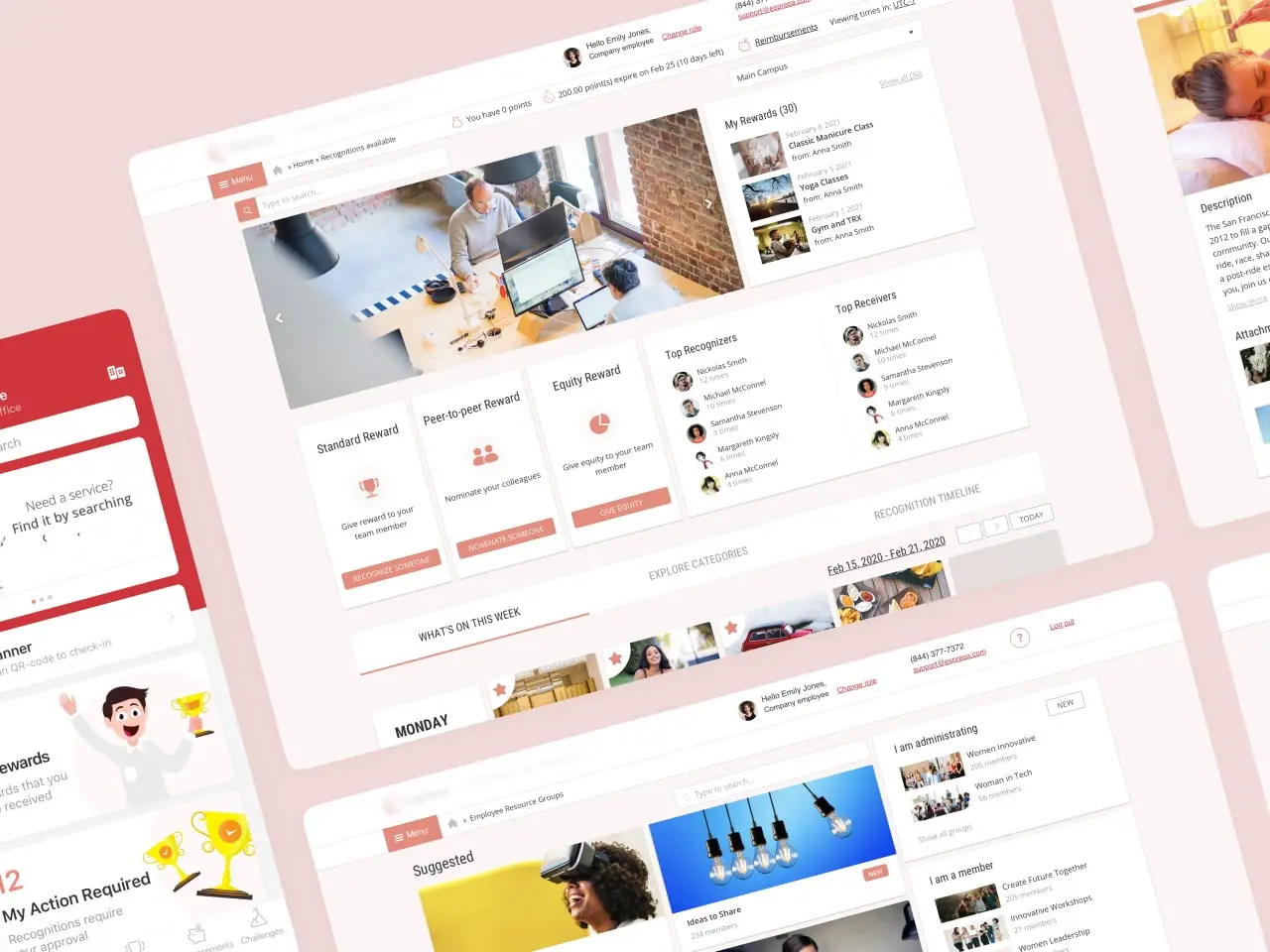A culture benefits platform delivering an immersive employer experience, contributing to better recognition of HR work, and improving the overall company’s image.
Implementing a Custom AI-Powered LMS for a Global Consulting Firm: Driving £7.5 Million in Annual Savings



Emerline transformed corporate learning for a leading global consulting firm by implementing a custom AI-powered LMS, resulting in over £7.5 million in annual operational cost savings.
Client & Background
Our client is a major international consulting firm headquartered in London, UK, and is ranked among the top 5 global leaders in strategic consulting. The company employs over 70,000 professionals worldwide who constantly need to acquire new industry knowledge, advanced methodologies, and specialized technology stacks to maintain their competitiveness and ensure high-quality client services.
Historically, learning and talent development were highly fragmented and decentralized. They relied on disparate legacy platforms (old Moodle systems, multiple SharePoint installations with training materials, unstructured folders on shared drives), manual progress tracking processes, and varying onboarding approaches across each office or department.
In an attempt to centralize and standardize learning a few years ago, the client implemented a unified SaaS LMS platform from a well-known vendor. However, despite initial improvements, this solution quickly lost its flexibility. Its limited customization options, rigid frameworks for integration with internal HR and project accounting systems, and the lack of built-in AI-driven personalization tools made it inadequate for the scale and complex needs of a dynamic consulting firm.
This fragmentation and the subsequent inflexibility of the SaaS solution led to a lack of a unified learning standard, chaos in knowledge management, extremely low employee engagement (less than 30% course completion), slow and inefficient onboarding for new consultants (up to 6-8 weeks to reach full productivity), and significant risks in mandatory compliance and certifications. Management recognized that their outdated L&D (Learning & Development) system did not match the business's scale and dynamism, hindering talent development and innovation.
Challenge
Fragmentation and chaos in knowledge management
Low engagement and ineffective learning
Slow and costly onboarding
Compliance risks and reporting complexities
Inefficient resource utilization and "overpaying" for external expertise
Methodology
Emerline applied an integrated Agile approach based on Scrum, specifically adapted to the high dynamism and unique needs of the global consulting industry. We placed a strong emphasis on User-Centric Design to ensure maximum convenience and intuitiveness of the platform for constantly busy consultants working across different time zones and on various projects. The methodology also included deep, continuous analysis of specific corporate data (including competency profiles, project performance results, and training feedback) for effective AI implementation.
This approach ensured not only flexibility and transparency in development but also continuous and precise alignment of the solution with the client's complex, rapidly changing talent development needs, and allowed for early value delivery through an MVP.
Solutions and Key Features
Emerline developed a custom, AI-optimized LMS that became the client's unified, intelligent hub for learning, development, and knowledge management. This cloud-based solution, built with high security and scalability requirements in mind, completely transformed the approach to talent development.
Our custom LMS differentiates itself from off-the-shelf solutions by its ground-up design for modularity and deep integration, specifically addressing the limitations of rigid, vendor-locked platforms:
Native customization and flexibility
Unlike SaaS solutions that offer limited configuration, our custom build allowed for precise tailoring of workflows, data models, and UI/UX to the client's unique consulting methodologies and multi-departmental needs. This avoided the expensive, cumbersome "workarounds" or core system modifications that lead to high TCO and compliance risks with off-the-shelf products.
Deep AI integration
AI capabilities are not bolt-on features but are native components of the LMS architecture, leveraging the client's vast internal data for truly personalized and adaptive learning experiences. This level of integrated intelligence is typically unattainable with standard SaaS offerings.
The LMS we developed integrates AI as a core architectural component, leveraging the client’s extensive internal knowledge base to deliver truly personalized and adaptive learning experiences. This level of built-in intelligence is far beyond what standard SaaS solutions can offer.
Full data ownership and control
The custom nature of the solution provides the client with complete ownership and control over their learning data and intellectual property, a crucial factor for a knowledge-driven consulting firm concerned with data privacy and strategic insights.
Because the solution is fully custom-built, the client retains complete ownership and control over all learning data and intellectual property – an essential advantage for a knowledge-driven consulting firm where data privacy and strategic insights define success.
Intelligent personalized learning paths
The LMS analyzes an employee's competency profile (based on data from HR systems, test results, project activities), their role, previous learning outcomes, and career aspirations, offering unique, adaptive learning trajectories. This ensures maximum content relevance and increases engagement.
Adaptive testing and assessment
AI models dynamically adjust the difficulty of test questions and tasks based on user responses, providing a more accurate, faster, and objective assessment of knowledge levels, as well as identifying competency gaps that require further development.
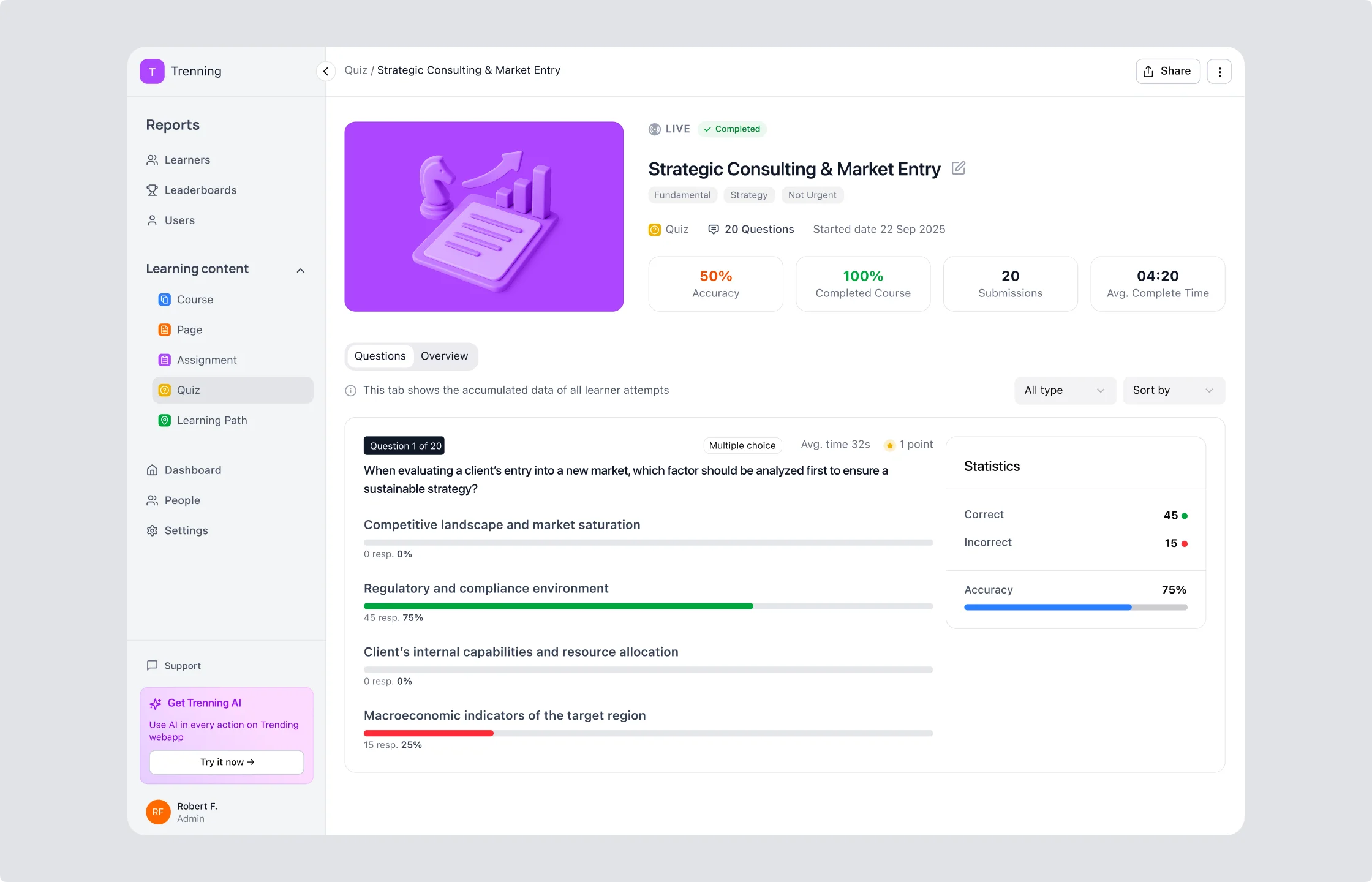
Intelligent expert and content matching
The system uses AI to automatically match employee needs with the company's internal expertise, recommending relevant mentors, internal subject matter experts, or the most relevant courses and materials from the vast centralized knowledge base.
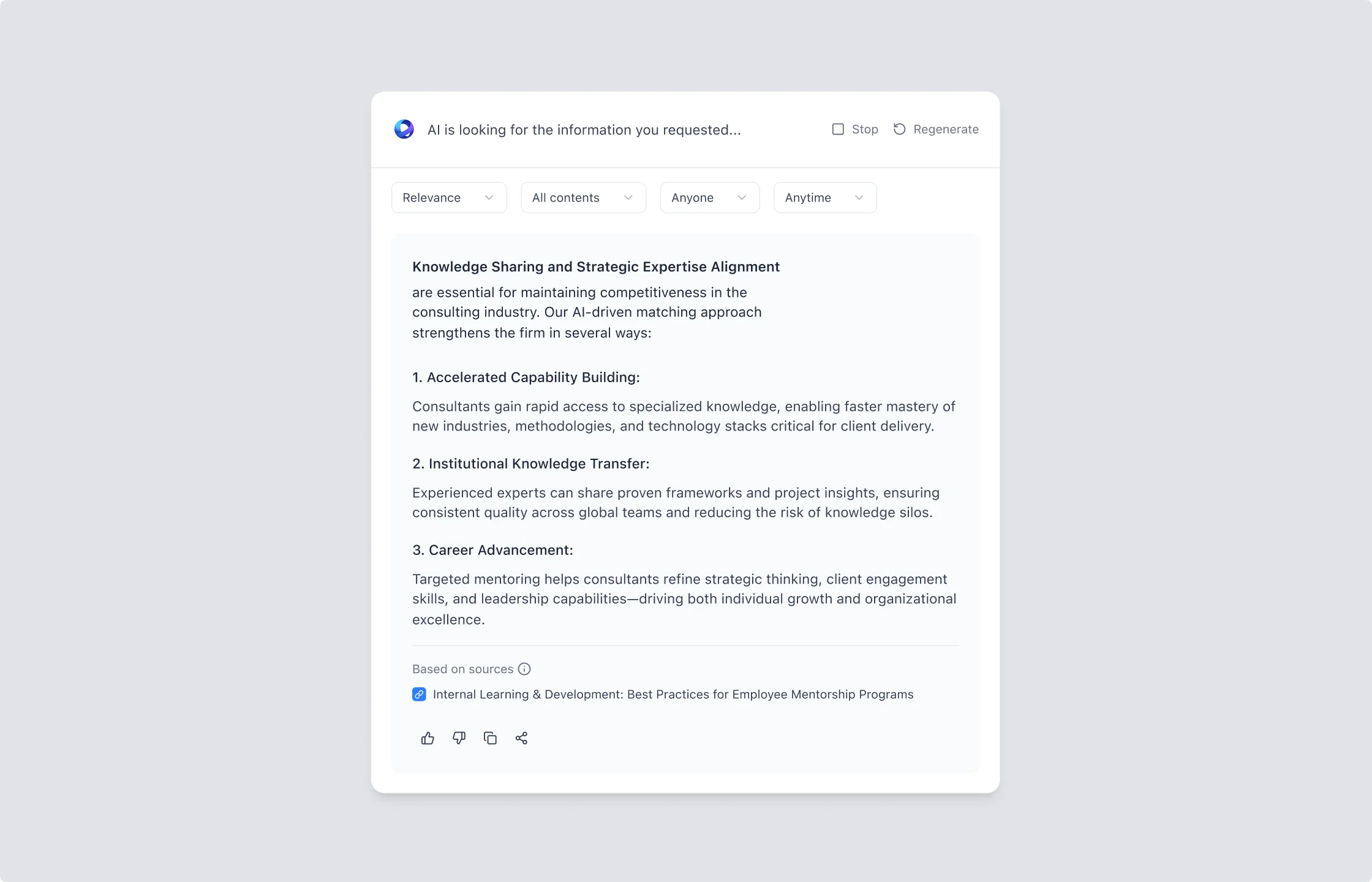
Centralized knowledge base and streamlined onboarding
The LMS consolidated all valuable internal expertise, project methodologies, guides, and processes into a single, easily accessible, and continuously updated repository. For new employees, this means a structured, automated onboarding process with step-by-step instructions and access to necessary information from day one.
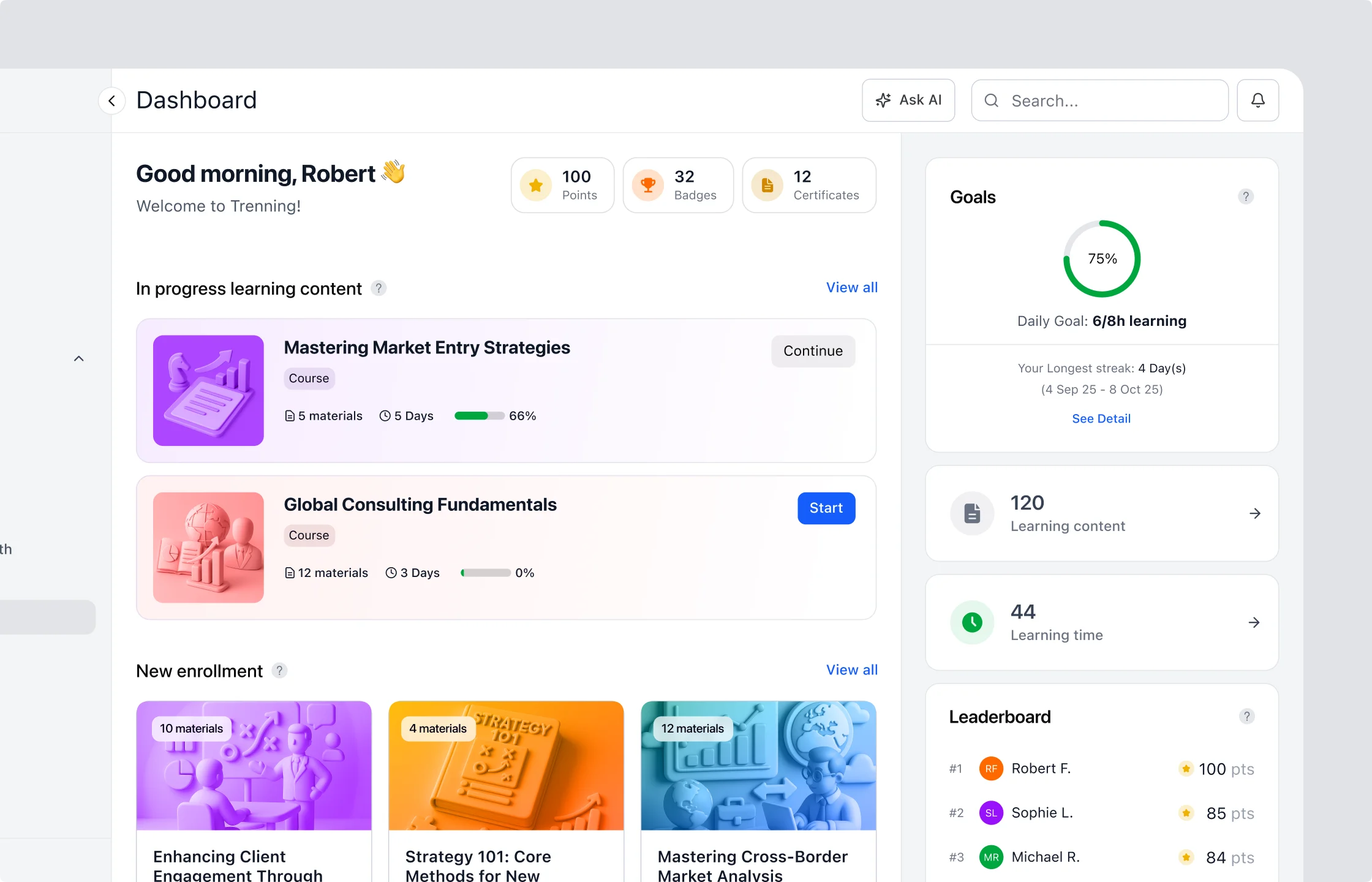
Automated compliance and certification tracking
The system automatically tracks the completion of mandatory compliance courses (e.g., anti-corruption, ethical norms, confidentiality requirements) and the status of employee professional certifications, generating reports and notifications for HR and management, minimizing non-compliance risks.
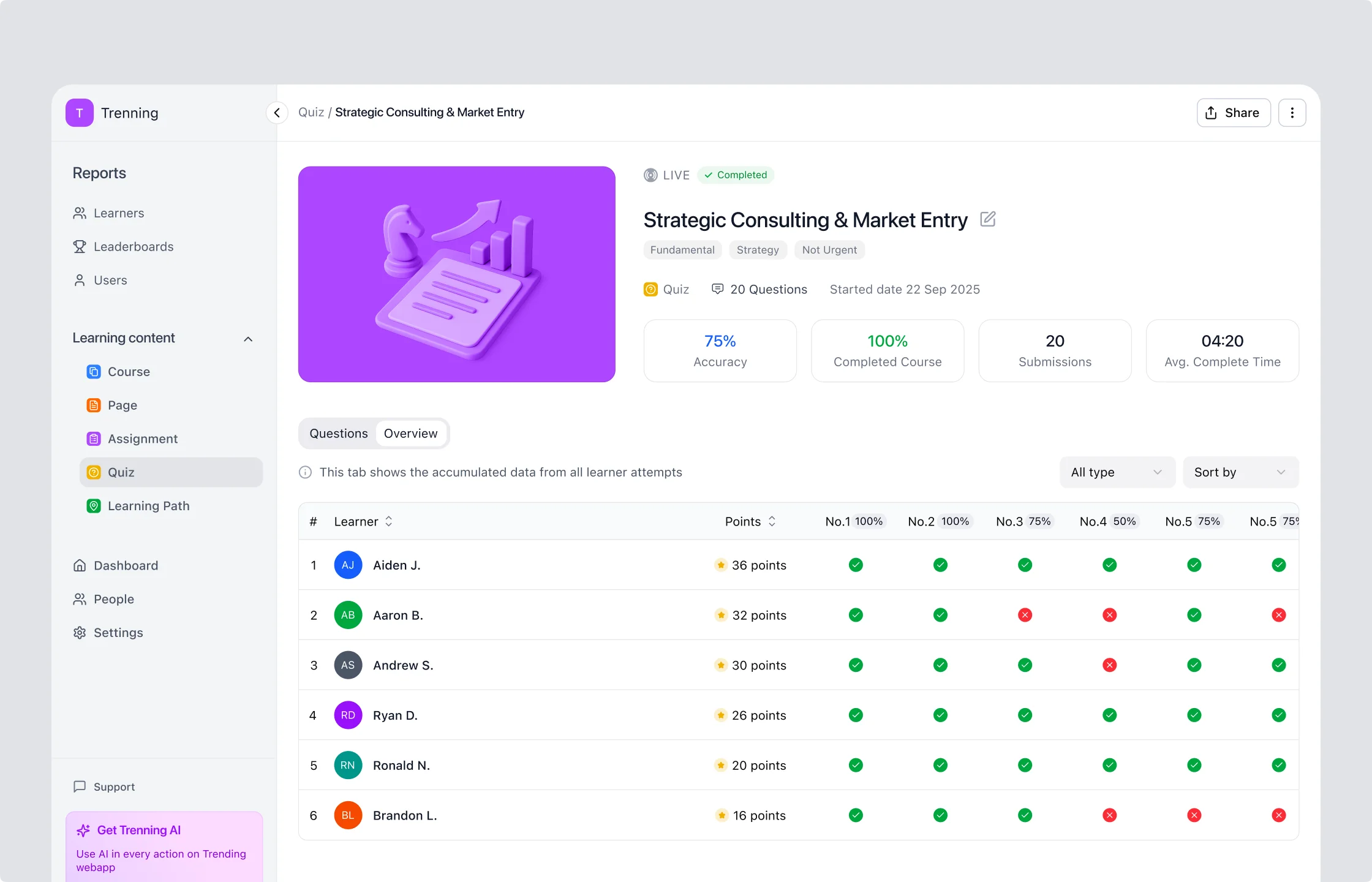
Gamification for increased engagement
Gamification elements (points, badges, leveling systems, leaderboards, challenges) are deeply integrated into the LMS to stimulate competition, increase internal motivation, and overall engagement in the learning process.
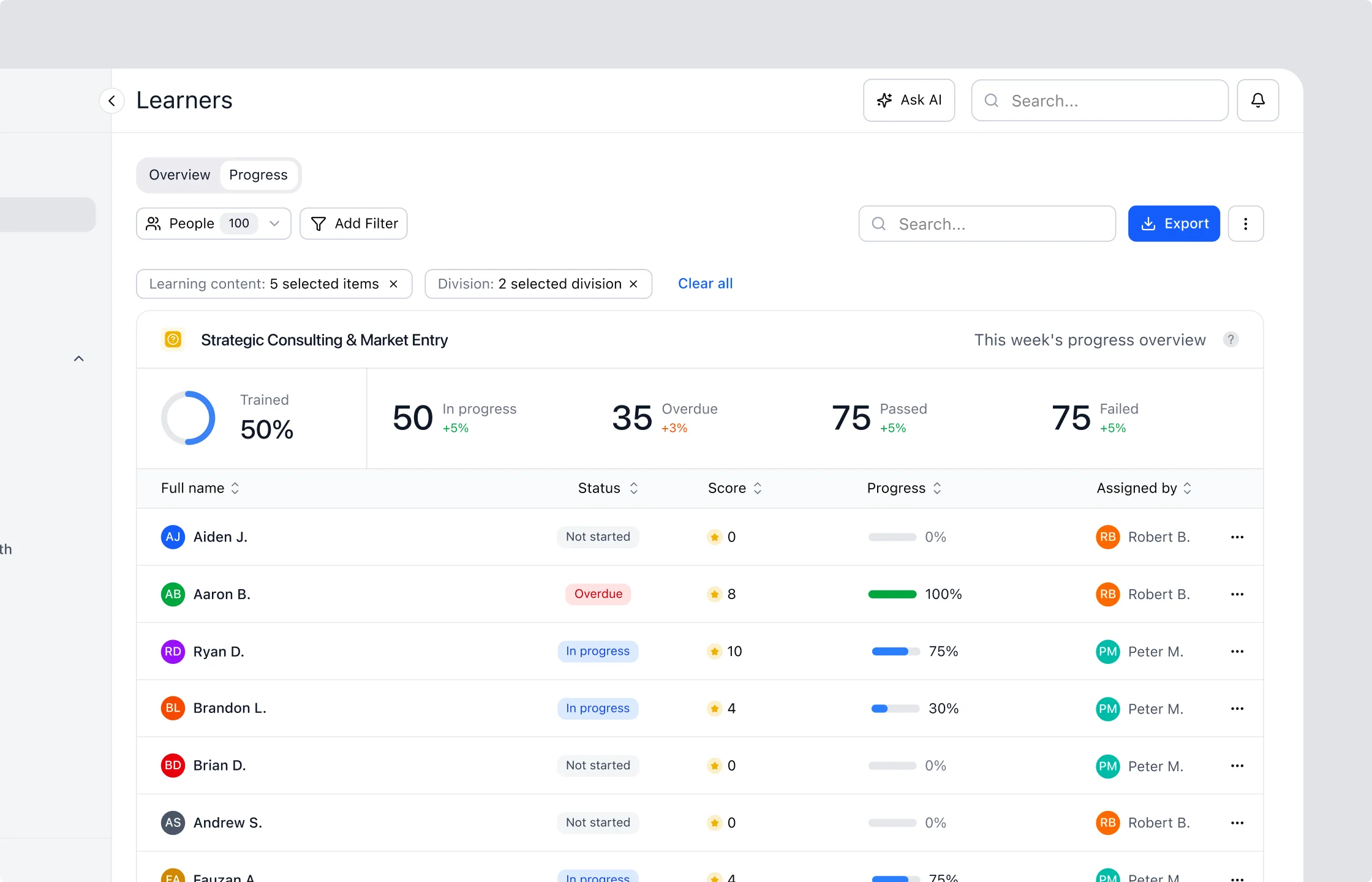
Advanced L&D analytics
Powerful analytical tools provide the HR department and management with deep insights into learning progress, the effectiveness of each course, employee competency levels across various specializations, and the actual ROI (Return on Investment) of development programs, enabling data-driven strategic decisions.
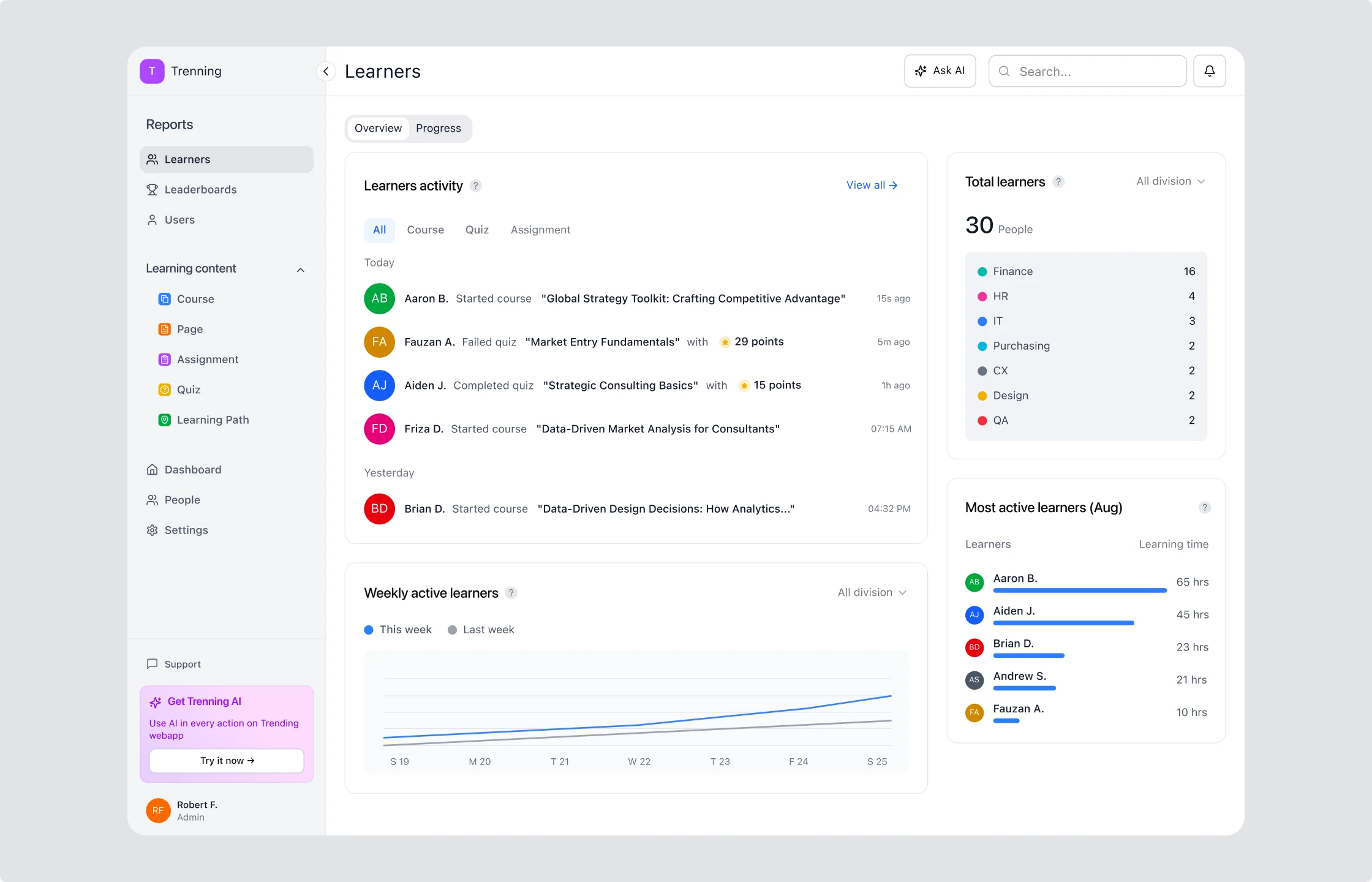
Technology Stack
The custom LMS is built on a modern, flexible, and scalable Laravel + AWS technology stack, ensuring high performance, enterprise-grade security, and effortless scalability to meet evolving business needs.
Results
The implementation of the custom AI-powered LMS fundamentally transformed the client's approach to talent development, bringing measurable improvements that significantly exceeded expectations:
- 60% increase in learning engagement
Personalized learning paths and relevant content significantly increased employees' interest in acquiring new skills, leading to a rise in course completion rates. Prior to the LMS, average online course completion rates were less than 30%; this increased to over 48% after implementation.
- Significant cost reduction and efficiency gains
- — Annual operational cost savings of over £7.5 million
This figure is calculated based on a detailed analysis of increased overall consultant productivity (e.g., higher billable hours, faster project delivery due to immediate knowledge access), optimized use of working time for acquiring new competencies, and reduced administrative overhead for L&D. This translates directly into tangible financial benefits for the company.
— 25% reduction in external training costs
The system effectively identified and centralized internal expertise, reducing the need for costly external courses and training, contributing to overall L&D budget optimization. Previously, the firm spent up to £10 million annually on external training.
- Improved talent preparation and accelerated onboarding
- — 50% faster onboarding for new employees
A structured process, centralized access to knowledge, and automated learning paths allowed new consultants to acclimate to the company faster and reach full productivity. Onboarding time was reduced from an average of 6-8 weeks to 3-4 weeks.
— 70% optimization of compliance reporting
Automated tracking of mandatory training significantly reduced HR department workload and lowered regulatory non-compliance risks. This means a 70% reduction in the manual hours previously required for compliance tracking.
- Increased productivity and employee satisfaction
- — Improved productivity and work quality
Faster access to up-to-date knowledge and targeted skill development directly contributed to increased efficiency and quality of consultants' work on projects, as evidenced by an average 10% increase in project delivery speed and client satisfaction scores within the first year.
— Increased employee satisfaction
The individualized approach to development and the platform's ease of use improved employees' overall experience with L&D programs. Internal surveys showed a 25-point increase in employee satisfaction related to learning and development opportunities.
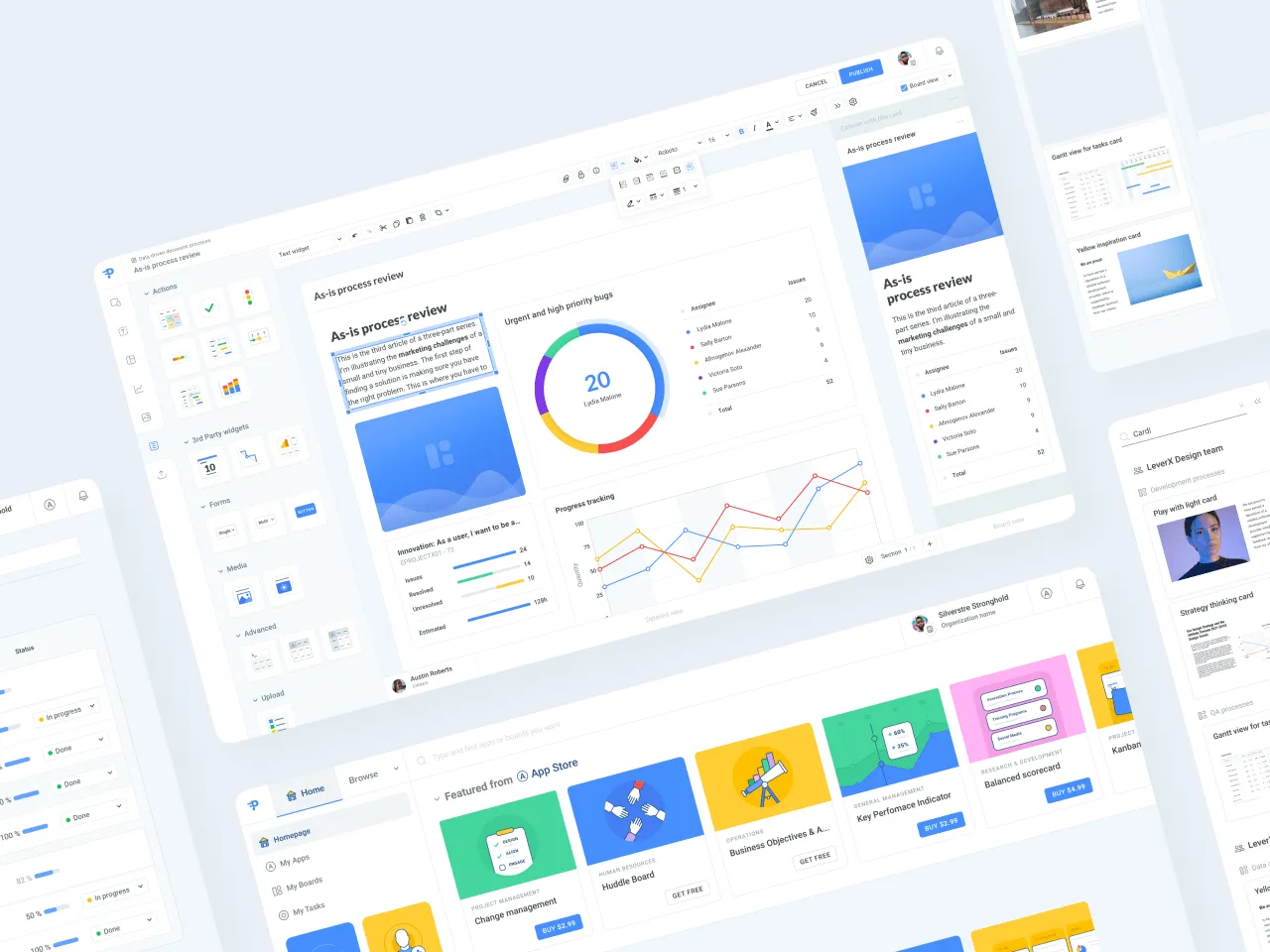
Online collaboration solution to boost team’s productivity and efficiency.
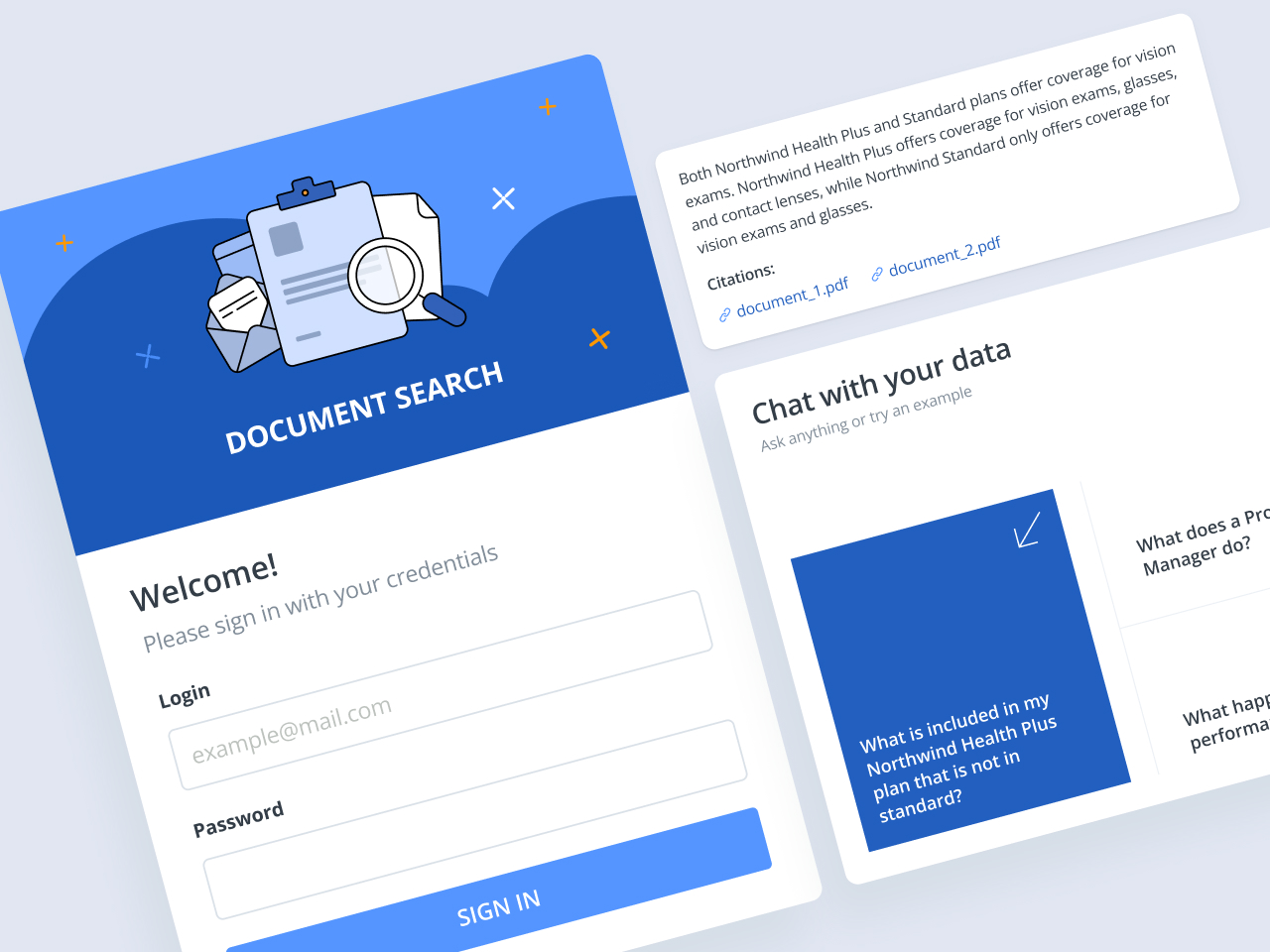
Emerline has developed an innovative AI-powered chatbot document search service tailored for B2B customers, designed to significantly enhance document management and retrieval processes in a business environment.
